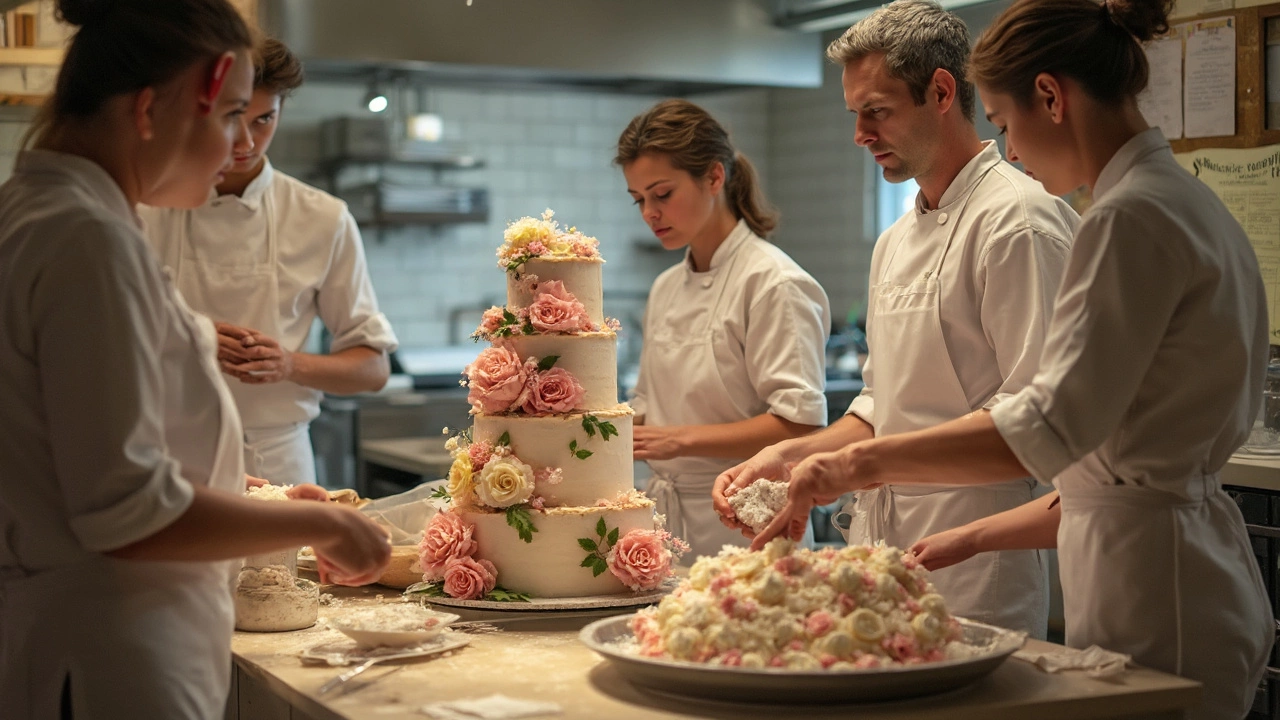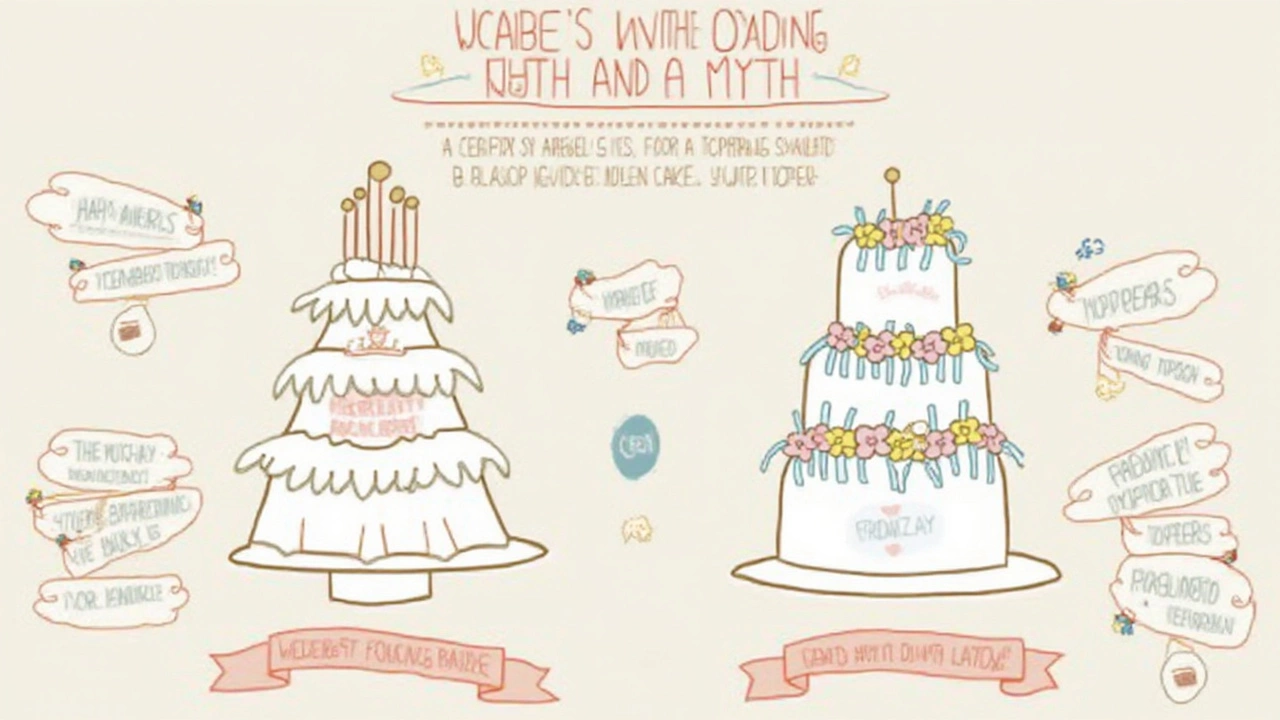Why Bakeries Charge More for Weddings: The Real Reasons Explained
 May, 17 2025
May, 17 2025
Everyone’s heard the joke: ask for a birthday cake, get a decent price. Mention it’s for a wedding, and suddenly your wallet winces. What gives? It’s not because bakeries want to rip you off for your big day.
There’s actually a whole lot more happening behind the scenes. Wedding cakes aren’t just pretty—bakers are juggling more details, custom designs, pressure, and, honestly, higher stakes. If the cake flops at a wedding, it’s a disaster. Mess up a birthday cake, and you get a slightly annoyed party. That risk—and responsibility—pushes up the price.
And let’s be real: you’re paying for more than just flour and eggs. You want tasting sessions, perfect finishes, tiers that defy gravity, and deliveries timed down to the minute. You’re not just buying dessert; you’re buying peace of mind and a wow moment in front of all your friends and family.
- The Wedding Premium: What Changes the Price?
- What Goes into a Wedding Cake (That Doesn’t in a Birthday Cake)
- Bakeries’ Hidden Costs and Pressures
- How to Get the Most Value from Your Bakery
- Smart Questions to Ask Your Cake Maker
The Wedding Premium: What Changes the Price?
So why does a cake cost more when it's for a wedding? Hint: it’s not just about the extra frosting. Wedding cakes are in a whole other league compared to everyday cakes, mostly because of expectations, planning, and pressure.
The biggest thing driving up the price is the custom work. Most wedding cakes are built from scratch, styled to fit the couple’s vision. Designs are usually complex—think sculpted flowers, hand-piped lace, multiple tiers, and often unusual flavors. All this individual attention takes time and skill that regular cakes just don’t demand.
Bakeries also factor in the “wedding insurance.” They have to be extra careful—one little smudge or a late delivery can ruin a couple’s day, and they know you’ll remember (and talk about) a wedding cake mishap for years. So, they plan backup materials and extra time, and often only take a limited number of wedding orders per week to avoid overbooking. That means every cake carries more of the shop’s fixed costs.
- wedding cake pricing usually includes consultation fees so you can taste different flavors and discuss designs.
- Delivery is rarely just dropping off a box—bakeries send a team to set it up, stack it on-site, and make last-minute fixes if anything shifts in transit.
- Wedding cakes often require special stands or structures to avoid collapse, which are sometimes rented as part of the price.
Here’s a quick look at how the numbers usually stack up:
| Type of Cake | Average Cost (USD) | Typical Extras |
|---|---|---|
| Birthday Cake | $40-$100 | Simple designs, basic delivery |
| Wedding Cake | $300-$800 (small), $1,000+ (large/complex) | Custom design, tastings, delivery, set-up, support |
Another thing you might not realize: wedding venues often have strict timing, which makes the bakeries juggle their entire schedule around your event. That causes extra overtime and sometimes even extra staff just for your cake. All these little tweaks add up.
What Goes into a Wedding Cake (That Doesn’t in a Birthday Cake)
Think a wedding cake and a birthday cake are pretty much the same thing? Not even close. Wedding cakes are a whole production, start to finish. There’s way more involved, and some things cake newbies wouldn’t ever guess.
First up, wedding cakes usually have those famous tiers. Each tier needs structure, so bakers use special dowels or supports—otherwise, your showpiece could collapse at the worst moment. As a pro baker from The Knot explains,
“Unlike regular party cakes, every wedding cake has to be built like a sculpture—toppling isn’t an option.”
Then there’s the flavor issue. Couples taste-test different combinations, so bakers spend more time prepping samples and blending unique fillings. Which means a lot more recipes and back-and-forth than just tossing in some vanilla and calling it a day.
Don’t forget design. Wedding cakes often mean intricate sugar flowers, sharp fondant edges, watercolor painting, gold leaf details—the list goes on. Basic birthday cakes can take a baker a couple of hours, but a wedding cake’s decorations might stretch across multiple days.
And here’s a biggie: delivery and setup. Wedding cakes have to get to the venue in perfect shape, which involves careful packing, temperature control (no one wants a melted tier), and precise assembly on-site. It’s not just a handoff at the bakery counter.
- Custom consultations and sketching out designs
- Tastings for deciding flavors
- Engineering tiers and supports
- Handcrafting detailed decorations
- Coordinating with your venue on timing and table setup
If you’re comparing, a wedding cake order covers a lot more steps and attention to detail than anything you’d get for a birthday celebration. That extra work? It all adds up in the price.

Bakeries’ Hidden Costs and Pressures
Ever notice that wedding cakes seem to come with a built-in price hike? Here’s what’s going on behind bakery doors. First off, labor isn’t cheap. Wedding cakes are all about hands-on hours: consults, sketching custom designs, endless tastings, and turning those Pinterest dreams into reality. For a big cake, a skilled decorator can spend 10–20 hours just on the details. That’s a lot of wages going into one order.
Then there’s the gear. Wedding cakes usually need specialty tools—molds, extra cutters, gorilla-strength supports—plus boxes and custom stands for safe delivery. Those materials don’t come free. Some bakeries even rent commercial kitchen space by the hour for wedding work, adding more to the price tag.
So many wedding cakes have to travel miles to the venue, often on the hottest or muggiest days. Safe, on-time delivery? It takes a trained driver, climate control, and a vehicle that’s spotlessly clean. Insurance for just this risk can run hundreds of dollars per event. One small traffic jam can cost big if it means reworking the cake last-minute.
- Extra staff for weekends (when all weddings seem to happen)
- Cost of premium ingredients—think Belgian chocolate or organic berries
- Scheduling crunch, since a bakery still needs to handle regular orders
Probably the biggest pressure? There’s no redo. Wedding cakes are a one-shot deal. If the cake collapses, it’s not just a sad dessert—it’s THE moment everyone remembers. That’s a ton of stress on the baker, and it gets baked into the price. If you see a big number next to wedding cake pricing, now you know: you’re not just paying for cake. You’re paying for a safety net, reliability, and peace of mind on your once-in-a-lifetime day.
How to Get the Most Value from Your Bakery
If you want a beautiful cake without blowing your entire wedding budget, there are some pretty straightforward ways to keep costs in check. Start by being honest about your must-haves and what you can skip. Every extra detail—like fondant flowers or hand-painted designs—can add hours of work, and that means you’ll pay more.
One huge tip: book your bakery early. Top cake makers fill up fast, especially in peak wedding seasons. Getting on their calendar months in advance isn’t just about securing your spot—it can lock in prices before they rise (lots of bakeries do annual increases). You’ll also want to sign a clear contract, so you both know what’s included and what’s extra.
Don’t be shy about asking for a cake tasting. Some bakeries offer them free, some charge a fee that goes toward your final cost. Tastings are your chance to see if their cake is actually good and if you like working with them. Not all expensive cakes taste great, so this step matters.
If your guest list is huge, consider going with a smaller display cake for cutting (and photos), then supplement with kitchen cakes or sheet cakes to serve everyone. These are way less expensive and nobody eating the slices will know the difference. Bakers know this trick, and most are happy to help you save some cash if you ask.
Also, don’t assume you have to order every tier in a different flavor. Sticking with one or two classic choices—chocolate, vanilla, or lemon, for example—saves you money and time. More flavors mean more prep, more materials, and higher costs.
- Communicate your budget clearly upfront and ask for suggestions to keep things affordable.
- Look for ways to simplify decoration—swap sugar flowers for fresh, or skip intricate piping.
- Ask about rental options for display stands or fancy toppers, so you don’t have to buy them outright.
- Double-check what’s included in the delivery and setup fees, and see if you can save by picking up the cake yourself (only if you trust your steady hands on bumpy roads).
Last thing: when you look for value, look at the whole package. Is the bakery reliable? Do their cakes actually taste amazing? Reviews and word of mouth matter way more than a picture-perfect Instagram feed. Chasing the lowest price can backfire—sometimes what you really want is peace of mind, especially when it comes to your wedding cake pricing and experience.

Smart Questions to Ask Your Cake Maker
Don’t get shy about peppering your baker with questions—your wedding cake pricing depends on it! Most couples don’t realize how much the little details can change the final bill. Here’s what you should always ask to avoid surprises.
- What's included in the price? Some bakeries charge extra for things like delivery, stands, or even basic design work. Always ask for a detailed breakdown.
- Can we do a tasting, and is it free? Tasting sessions are often free if you order, but can cost up to $50 or more if you don’t. Ask before you book one.
- Is there a fee for multiple flavors or fillings? Want each tier to have its own surprise? That usually costs more. Ask for specifics.
- How far in advance should I order? Many wedding cake makers book out six months to a year ahead—especially for summer weddings. The earlier you know, the better your options.
- How do you handle allergies or dietary requests? If Grandma needs gluten-free or you’re dairy-free, get clear answers. Some bakeries handle these in-house, others outsource or simply can’t promise no cross-contamination.
- What about delivery, setup, and emergencies? Some include delivery within a certain radius. Others charge per mile. And always ask: What happens if something goes wrong (think: heatwave, traffic jams, toppled cake)? Having a plan matters.
- What’s your most popular size for X guests? Don’t just go by looks—get practical. Cake makers can figure out the right size for your guest count, which can save you big money or keep you from running short.
Pro tip: Get every answer in writing as part of your contract. If a baker won’t write it down, it’s time to walk.